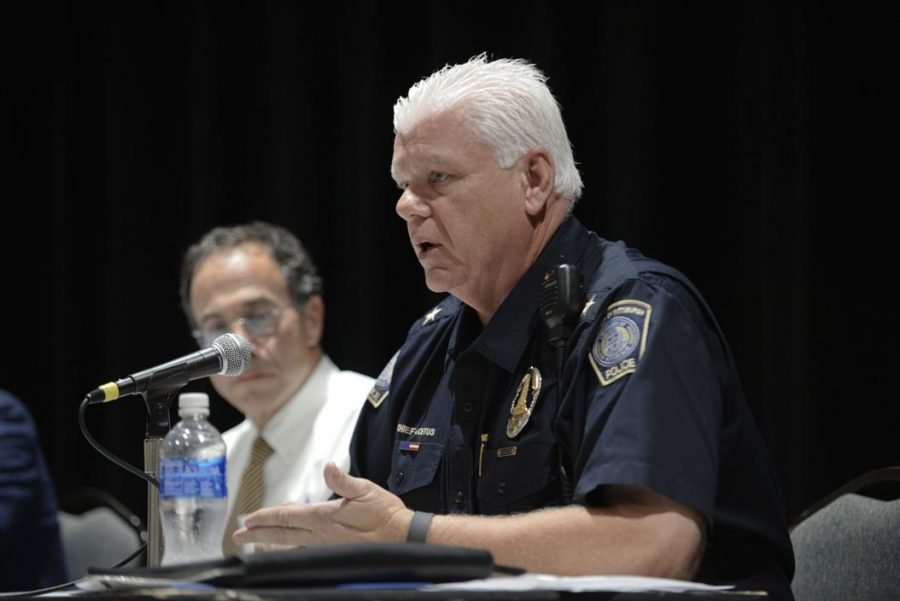Representatives from city police, Pitt police and the University met for a wide-ranging panel to answer Pitt students’ questions about safety and police-community relations Thursday evening.
About 50 students attended the Pitt Community Forum, which the Student Government Board hosted in the William Pitt Union Assembly Room at 7 p.m. The panel consisted of Commander Eric Holmes of the Pittsburgh Police Department –– representing Chief Cameron McLay –– as well as Vice Provost and Dean of Students Kenyon Bonner and Pitt Police Chief James Loftus, among other community official representatives.
Nicholas Fisher, chair of SGB’s community and governmental relations committee, organized the event to give students a chance to connect with community leaders and administrators.
“I saw students being concerned about a lot of issues on campus and everyone had different ways of approaching the issues,” Fisher said. “The community meeting was a way to bring different views together as a big picture event.”
Although the forum was meant to demystify police and Pitt policies, some students left feeling their concerns and questions had not been fully addressed.
One of those students, Cindy Lam, a senior communication major and a resident assistant in Litchfield Tower C, said she wanted the panel members at Thursday night’s event to address sexual assault training and safety. Lam had planned on passing on this information to her residents. Instead, she said the discussion was generalized and ambiguous.
“I know the police officers are saying we need to be more aware, but having specific examples about how to stay safe and how to defend ourselves would have been better,” Lam said.
Fisher said the answers to the students’ questions were free-form at the discretion of the panel members, leaving it up to the panel to decide how specifically to address each issue.
To ask the panel to discuss specific issues, students submitted questions ahead of time through a Google Form set up by SGB. The Board received nine replies from students before the event, according to Fisher. In order to get the most information in a limited amount of time, SGB morphed similar questions into broad categories including bike safety, sexual assault, diversity in Pittsburgh and off-campus housing. Students in the audience who had not yet submitted questions were able to talk to a member of SGB to see if their questions could be asked during the forum.
“It was the best way to have a productive discussion in an hour-and-a-half,” Fisher said.
The categories the panel addressed
For each issue, the panelists discussed how the city and the University were working to address issues, such as sexual assault reporting.
“The number of sexual assaults reported has increased for three reasons,” Bonner said, “There is more awareness about what qualifies as sexual assault, there is more confidence and trust in resources and [there are] more resources.”
Kendall Oakley, a sophomore communication and nonfiction writing major, said she attended the panel to hear what the panel members had to say about national events such as recent police shootings in Charlotte, North Carolina and Tulsa, Oklahoma.
“What happens in the world trickles down to the student body and makes them feel uncomfortable,” Oakley said. “The shootings lead to racial tension among students.”
Before and during the forum, protestors took the streets of Downtown and the Schenley Plaza to speak against police brutality. Oakley did not ask specifically about the police shootings at the forum, and it was not brought up during the panel.
At the end of the forum, students asked panelists about their visions for the University and city as a whole. The speakers encouraged students to get involved with the issues, hoping to convince them to stay in Pittsburgh post-graduation to continue making it better.
“If Pitt does well, the city does well,” Bonner said. “If the city does well, Pitt does well.”


